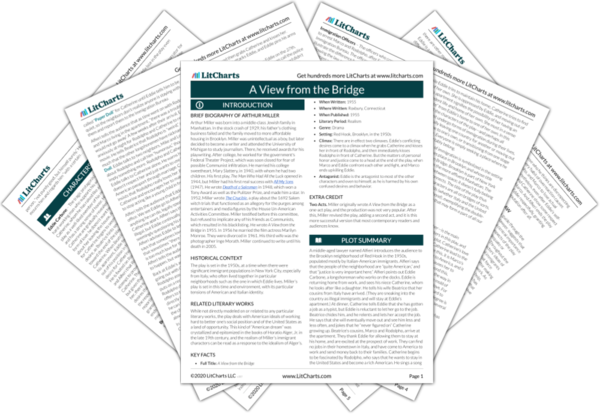The play takes place in an immigrant community—a neighborhood full of Italian immigrants both legal and illegal—and is a vivid portrayal of the immigrant experience in the United States, an immigrant nation founded by those who left their homes in Europe but one that has not always been welcoming to foreigners. As seen in A View from the Bridge, immigrants often come to America because it is, famously, supposed to be the land of opportunity. Rodolpho and Marco come to New York in search of jobs that are lacking in their Italian hometown, and are overjoyed at the money they can make working on the docks. But this doesn’t mean that immigrating to America is necessarily an entirely good thing. They have to live in hiding and are constantly in fear of being sent back to Italy (moreover, Marco plans to return to Italy eventually). In addition, Rodolpho and Marco have to deal with missing their original home, as can be seen when Rodolpho talks of the fountains in every town in Italy and, in an outburst, tells Catherine that America is not as great as she thinks it is. Through both Rodolpho and Marco, we see the ambivalence and difficulty of the immigrant experience. And through all the play’s characters, we see the gradual process of assimilating into a new nation. Alfieri, for example, begins the play by both invoking the Italian heritage of the neighborhood and insisting that its inhabitants are all thoroughly American now.
But the play does not simply depict the experiences of immigrants. Miller uses the topic of immigration to make larger points about the idea of home and a sense of belonging. Eddie takes pride in the home he works hard to maintain and is irritated when Rodolpho and Marco intrude on his place as master of his home. Throughout the play he struggles to maintain control over his home as a place where he belongs, but is gradually excluded from it as he drifts away from Catherine and Beatrice. By the end of the play, he hardly belongs in his own home, or even in his own neighborhood, as his neighbors shun him for betraying Marco and Rodolpho. While Eddie tries to maintain his home, Catherine tries to find one of her own. She is oppressed by Eddie, and moving out of Eddie’s apartment signifies the possibility of her having an independent life and home of her own. She must in a sense “immigrate” from Eddie’s home to one of her own. In this manner, all the characters of the play—and perhaps all people—must undergo forms of immigration during their lives, whether literally leaving one country for another or moving out of a family home to one’s own, or transitioning from one stage in life to another. Everyone is simply seeking a place where he or she can comfortably belong.
This pervasive idea of immigration is symbolized in the setting of the play, which takes place in Brooklyn and whose title alludes to the Brooklyn Bridge. Brooklyn is part of New York City, but separated from the more affluent Manhattan. The bridge represents an in-between space; it doesn’t fully belong to either of the shores it connects. The title of the play thus captures the way that its characters are all on bridges of sorts, straddling two different worlds (whether Italy and the United States, or childhood and adulthood), exemplifying the double-life of the immigrant experience that may form a part of all our lives.
Immigration, Home, and Belonging ThemeTracker

Immigration, Home, and Belonging Quotes in A View from the Bridge
But this is Red Hook, not Sicily. This is the slum that faces the bay on the seaward side of Brooklyn Bridge. This is the gullet of New York swallowing the tonnage of the world. And now we are quite civilized, quite American.
Listen, they’ll think it’s a millionaire’s house compared to the way they live. Don’t worry about the walls. They’ll be thankful.
Eddie:
There was a family lived next door to her mother, he was about sixteen—
Beatrice:
No, he was no more than fourteen, cause I was to his confirmation in Saint Agnes. but the family had an uncle that they were hidin’ in the house, and he snitched to the Immigration.
Catherine:
The kid snitched?
Eddie:
On his own uncle!
Catherine:
What, was he crazy?
Eddie:
He was crazy after, I tell you that, boy.
Beatrice:
Oh, it was terrible. He had five brothers and the old father. And they grabbed him in the kitchen and pulled him down the stairs—three flights his head was bouncin’ like a coconut. And they spit on him in the street, his own father and his brothers. The whole neighborhood was cryin’.
Me, I want to be an American. And then I want to go back to Italy when I am rich, and I will buy a motorcycle.
Do you think I am so desperate? My brother is desperate, not me. You think I would carry on my back the rest of my life a woman I didn’t love just to be an American? It’s so wonderful? You think we have no tall buildings in Italy? Electric lights? No wide streets? No flags? No automobiles? Only work we don’t have. I want to be an American so I can work, that is the only wonder here—work!
















